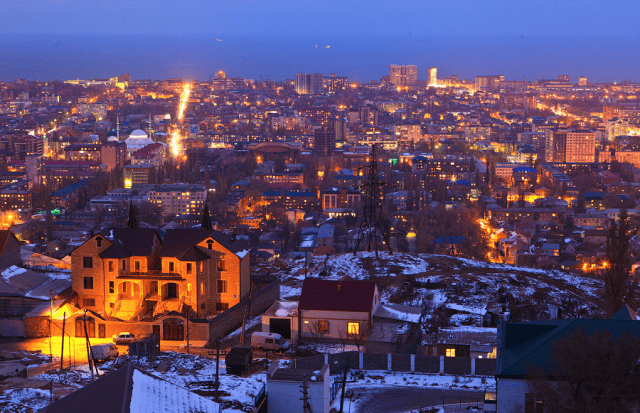Russia wants to upgrade the port of Makhachkala
ISSN 2975-0474

Kavkaz Files ISSN 2975-0474 Volume 1 Issue 1
Author: Giuliano Bifolchi
Russia plans to develop the infrastructure of the port of Makhachkala to transform the Dagestani capital into a logistic hub in the Caspian Sea and the Caucasus region and boost socioeconomic development. Moscow’s desire to upgrade Makhachkala’s seaport and airport challenges the city of Baku, and the Azerbaijani aim to become the Caspian interconnection.
Last week the First Deputy Minister of Economic Development of the Russian Federation, Mikhail Babich, visited the city of Makhachkala to discuss with local authorities the possibilities of enhancing the activities of the only ice-free port of Russia in the Caspian Sea. According to Babich, the Ministry of Economic Development of the Russian Federation plans to understand the necessary steps to attract additional volumes of oil, grain, and fish and improve the Dagestani economy.
The strategic role of Makhachkala Sea Trade Port
According to the General Director of the Makhachkala Sea Trade Port Murad Khidirov, the port can receive oil tankers with a carrying capacity of 13 thousand tons. Still, the ships can transport only 8.5 thousand tons because of the insufficient depth of canals. The port of Makhachkala needs to be upgraded through dredging operations that will increase the volume of oil and oil products transhipment by 2 million tons annually without creating additional capacities. Moreover, the head of Dagestan, Vladimir Vasilyev, stressed that dredging should not be very costly, and they will be partially financially supported by selling sand that will rise from the bottom.
The volume of cargo transhipment in the Makhachkala Sea Commercial Port for the first six months of this year increased by 20.4% compared to the corresponding period of 2019.
The Makhachkala Sea Commercial Port is Russia’s only non-freezing and deep-water port in the Caspian Sea, which accepts ships up to 150 meters in length and up to 4.5 meters in the draft. The port infrastructure includes a dry cargo harbour with a transhipment complex with a capacity of 3 million tons per year, berths for general, bulk cargo and containers with a capacity of up to 1.2 million tons per year, railway and car ferry terminals with a capacity of 1.3 million tons, a grain terminal with a capacity of 0.5 million tons per year.[3]
Conclusion
According to the Russian socioeconomic strategy in the North Caucasus, Makhachkala will become a logistic hub in the Caspian Sea, able to connect the Russian Federation with Iran (recently, Moscow and Tehran have improved their bilateral relations and cooperation agreements in different fields), the Central Asian republics, and the Belt and Road Initiative. The rise of Makhachkala threatens the near city of Baku, the capital of the Republic of Azerbaijan, where the local authorities have invested vast amounts of monetary funds in developing the city port and the local infrastructures to transform Baku and entire Azerbaijan in the Eurasian logistic hub.
Furthermore, the Caspian Sea is the epicentre of several energy pipelines and projects which link Central Asian and Caucasian oil and gas fields to Europe. In the face of EU – Russia confrontation and the EU Energy Security Strategy to decrease Brussels’ dependence on Russian energy exports, if the Russian Federation can improve the activities and centrality of the port of Makhachkala overshadowing the near Azerbaijan, the impact on Brussels-Moscow relations and energy market will be noticeable in favour of the Kremlin.
Do you like SpecialEurasia reports and analyses? Has our groundbreaking research empowered you or your team? Now is your chance to be a part of our mission! Join us in advancing independent reporting and unlocking the secrets of Eurasia’s complex geopolitical landscape. Whether through a one-time contribution or a monthly/yearly donation, your support will fuel our relentless pursuit of knowledge and understanding. Together, let’s pave the way for a brighter future. DONATE NOW and secure your place in shaping the geopolitical narrative.
